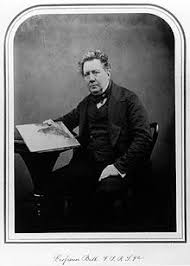
Thomas Bell
Thomas Bell (October 11, 1792 - March 13, 1880) was an English zoologist, surgeon, and writer born in Poole, Dorset, England. Bell, like his mother Susan, showed great interest in natural history, which his mother also encouraged in relation to his younger cousin Philip Henry Gosse. Bell left Poole in 1813 to teach dentistry in London. He combined two careers, becoming a professor of zoology at King's College London in 1836 (thanks to amateur studies) and lecturing on anatomy at Gaya Hospital. He became a member of the Royal College of Surgeons in 1844. He was president of the Linnaeus Society in 1858. Bell was at the center of a scientific institution, and when Charles Darwin returned to London from the Beagle expedition on December 2, 1836, Bell quickly took on the task of describing reptile specimens. He was also entrusted with samples of crustaceans collected during swimming. He was an authority in this area; his book British Crustaceans with Sharp Eyes is a masterpiece. He played a significant role in creating Darwin's theory of natural selection in March 1837, when he confirmed that giant Galapagos tortoises are aboriginal islands and not brought by pirates for food, as Darwin thought. He supported the organization of the publication “Zoology of Swimming H.M.S.” Beagle, but then moved very slowly to work, and although the first parts of the work were published in 1838, Bell's contribution to the reptiles (Part 5) was published in two issues, in 1842 and 1843, and he subsequently did not undertake any action against crustaceans. As president of the Linnaeus Society, he chaired a meeting on July 1, 1858, at which Darwin and Alfred Russell Wallace first published their theories of natural selection in a joint presentation of Trends of Species to Variety Formation; and the perpetuation of varieties and species by natural selection means. He clearly did not approve, and in his annual presidential report, submitted in May 1859, he wrote that “the past year has indeed not been marked by any of those amazing discoveries that simultaneously revolutionize the department of science, so to speak, in which they carry. "

